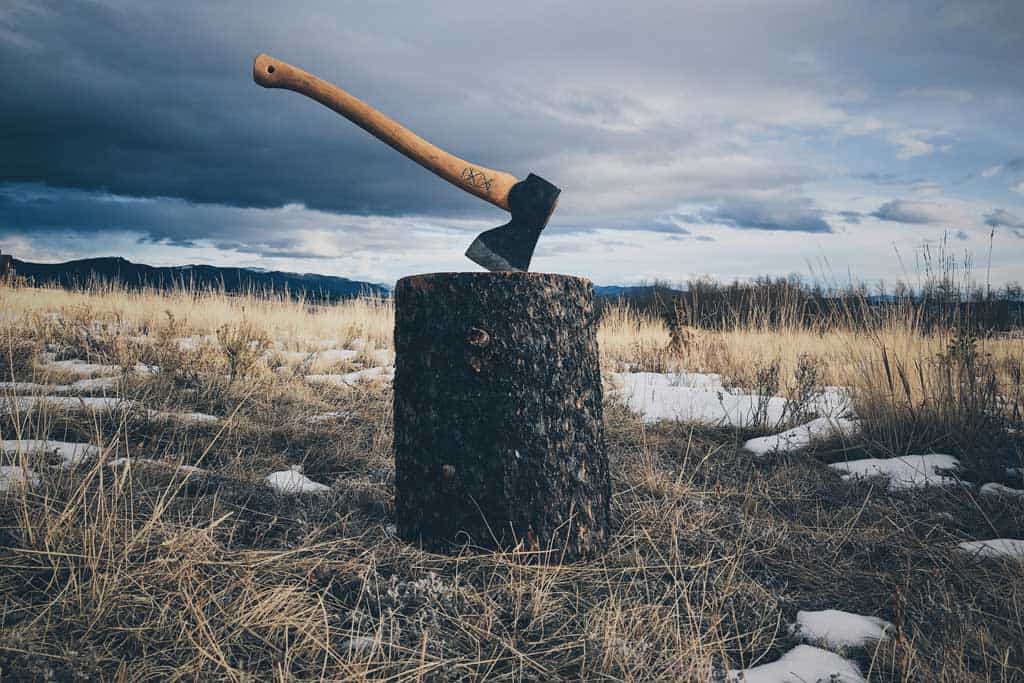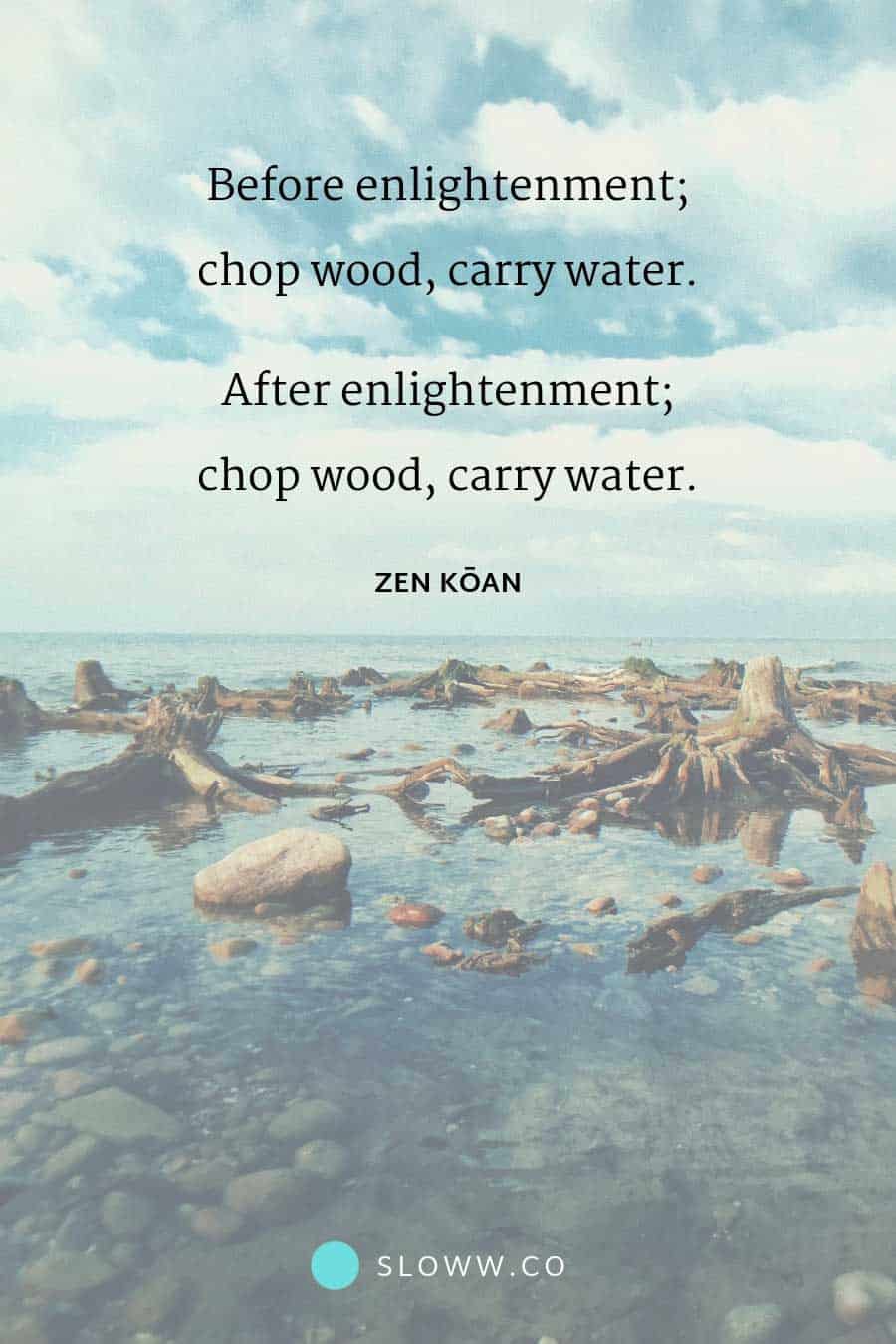We were recently having dinner with friends when a (highly intelligent) friend said, “All I want to do is chop wood in the forest.”
It immediately reminded me of the simple—yet profound—quote below.
So, I did some homework on it. Here’s everything I learned.

The Chop Wood, Carry Water Quote

The Chop Wood, Carry Water Origin
It doesn’t appear that there’s a consensus about the origin of this quote. Here are three possible sources that I found while researching.
1. Layman Pang, a Buddhist in the Zen tradition who lived from 740–808, wrote the following¹:
“My daily activities are not unusual,
I’m just naturally in harmony with them.
Grasping nothing, discarding nothing.
In every place there’s no hindrance, no conflict.
My supernatural power and marvelous activity:
Drawing water and chopping wood.”
Those last two lines are well-known and have been translated many different ways over the years, including²:
“How miraculous and wondrous,
Hauling water and carrying firewood!”
2. The quote has been adapted and expanded to add a little more context³:
“The novice says to the master, ‘What does one do before enlightenment?’
‘Chop wood. Carry water,’ replies the master.
The novice asks, ‘What, then, does one do after enlightenment?’
‘Chop wood. Carry water.'”
3. There’s also a completely different variation that offers more storytelling and explanation4:
“A young boy became a monk. He dreamed of enlightenment and of learning great things. When he got to the monastery he was told that each morning he had to chop wood for the monks fires and then carry water up to the monastery for ablutions and the kitchen. He attended prayers and meditation, but the teaching he was given was rather sparse.
One day he was told to take some tea to the Abbot in his chambers. He did so and the Abbot saw he looked sad and asked him why.
He replied every day all I do is chop wood and carry water. I want to learn. I want to understand things. I want to be great one day, like you.
The Abbot gestured to the scrolls on shelves lining the walls. He said, ‘When I started I was like you. Every day I would chop wood and carry water. Like you I understood that someone had to do these things, but like you I wanted to move forward. Eventually I did. I read all of the scrolls, I met with Kings and and gave council. I became the Abbot. Now, I understand that the key to everything is that everything is chopping wood and carrying water, and that if one does everything mindfully then it is all the same.'”
3 Meanings from the Chop Wood, Carry Water Kōan
A Zen kōan is “a story, dialogue, question, or statement which is used in Zen practice to provoke the ‘great doubt’ and to practice or test a student’s progress in Zen.”5
One of the great aspects of ancient quotes and stories is that they are subject to interpretation. Here’s my own personal take along with some of my favorite explanations of the meaning.
On the surface, the visible, external actions of chopping wood and carrying water are the same before and after enlightenment. So, what’s changed?
The deeper invisible and internal—your presence, awareness, perception, mindset. Your body may be busy, but your mind is still. You are present instead of preoccupied:
- “In simple terms we can say that before I developed the true nature of Wisdom I could chop wood and carry water but my mind was everywhere—it was heavily polluted with mental obstructions and worldly thoughts—it was not present. After I found the Essence of my Mind and found true Wisdom then I experience Enlightenment. To the external eye nothing is different—I still appear to chop wood and carry water but in fact within the internal eye everything is different. Everything has changed. It teaches us to be aware of the transience of visual forms. Nothing is what it appears to be and No thing is what it appears to be.”4
Growing up (and still to this day), I can hear my Dad saying:
- “Do what you’re doing while you’re doing it. Don’t do what you’re not doing while you’re not doing it.”
The being is more important than the doing. As Eckhart Tolle says in his book A New Earth: Awakening to Your Life’s Purpose:
- “Doing is never enough if you neglect Being. The ego knows nothing of being but believes you will eventually be saved by doing. If you are in the grip of the ego, you believe that by doing more and more you will eventually accumulate enough ‘doings’ to make yourself feel complete at some point in the future. You won’t. You will only lose yourself in doing. The entire civilization is losing itself in doing that is not rooted in Being and thus becomes futile.”
Chopping wood and carrying water are not glamorous activities, especially during the time these stories/quotes were written. If you are able to master your mind, you will find the extraordinary in the ordinary—the magic in the mundane (a tip from how to get started with slow living). Do you choose to see burden or beauty? Are you focused on presence or productivity?
- “Before Enlightenment…You chop wood and carry water, but secretly wish to get out of it all. You bear with these activities through habit and out of hopelessness, but you really wish you could do something else. In a way, you are a victim, a slave — the wood chops you and the water carries you, and there is no way to escape…After Enlightenment, you are in harmony with the universe…so you see that there is nothing more important than chopping wood and carrying water. All activities are equalized, there is no preference, no discrimination. Because there is no ‘you’, no ego, no personality, no being, no separate individuality — there is no conflict. No need to escape…because you have mastered your mind, you are not chopped by the wood and carried by the water anymore. You can flip your perspective at will. It is your choice to chop wood and carry water, and you live it in complete suchness and spontaneity.”4
If you refer back to Layman Pang, he said, “My daily activities are not unusual, I’m just naturally in harmony with them.” Enlightenment isn’t concerned with amazing external activities—it’s available to everyone.
Instead of resisting and loathing the repetitive, daily routines and chores you don’t want to do, you can choose gratitude for the small things—that you have hands, strength, and health to perform these actions. Try something as simple as being mindful at mealtime.
- “Non-resistance, non-judgment, and non-attachment are the three aspects of true freedom and enlightened living.” — Eckhart Tolle
Mastering your mind is your own responsibility:
- “The only Zen you find on tops of mountains is the Zen you bring there.” — Robert M. Pirsig
- “If you are not taking responsibility for your state of consciousness, you are not taking responsibility for life.” — Eckhart Tolle
Everything in life is impermanent—even enlightenment is transient. If/when you achieve enlightenment, it’s not like you can say, “Whew! Thank goodness I’m finally enlightened. That was a long journey, but I’m glad I’ve made it to the end.”
Remember, the longer story version of Chop Wood, Carry Water at the beginning of this post says:
- “The key to everything is that everything is chopping wood and carrying water, and that if one does everything mindfully then it is all the same.”
If you view everything as chopping wood and carrying water, you realize you constantly have to maintain present awareness:
- “It does little good to attain clarity of mind on your meditation cushion if you lose it as soon as you become active.”6
We all know this isn’t easy. Overcoming the unconscious default setting of your mind is a key point in David Foster Wallace’s iconic speech, This is Water:
- “The most obvious, important realities are often the ones that are hardest to see and talk about.”
Since enlightenment is a state and not a destination, that means we all still have to go on living even after attaining enlightenment. The goal then is to have your doing rooted in being to create awakened doing:
- “Awakened doing is the alignment of your outer purpose what you do – with your inner purpose – awakening and staying awake. Through awakened doing, you become one with the outgoing purpose of the universe. Consciousness flows through you into this world. It flows into your thoughts and inspires them. It flows into what you do and guides and empowers it.” — Eckhart Tolle
Is the wood chopping you and the water carrying you? Or, are you chopping the wood and carrying the water? The responsibility is yours.
You May Also Enjoy:
Sources:
- https://tricycle.org/trikedaily/green-koans-case-36-pang-splits-wood/
- https://en.wikipedia.org/wiki/Layman_Pang
- https://writingdownthestory.com/2016/11/12/chop-wood-carry-water/
- https://buddhism.stackexchange.com/questions/15921/what-is-the-meaning-of-the-zen-quote-before-enlightenment-chop-wood-carry-wat
- https://en.wikipedia.org/wiki/K%C5%8Dan
- http://www.interluderetreat.com/meditate/chop.htm




